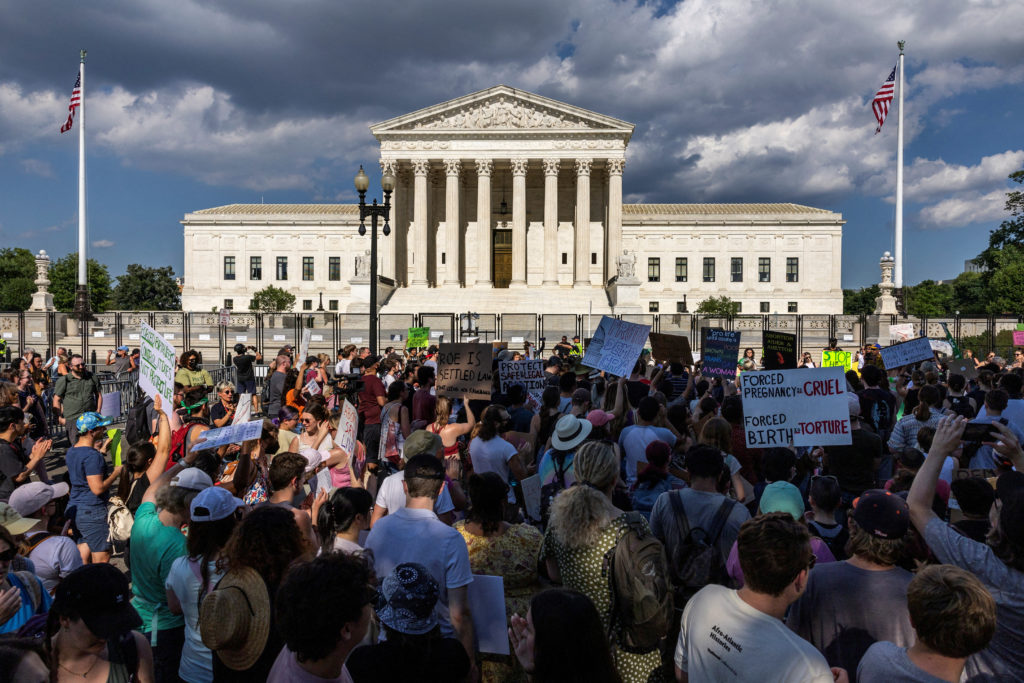The U.S Supreme Court on Thursday protected abortion pill mifepristone in its latest abortion ruling. The Court reversed a lower court ruling that threatened access to mifepristone, a medication used in medication abortions. This unanimous decision, authored by Justice Brett Kavanaugh, comes two years after the landmark Roe v. Wade overturning. The ruling upholds the Food and Drug Administration’s (FDA) 2016 and 2021 regulations that streamlined access to the drug.
The justices ruled the plaintiffs lacked legal standing, meaning they couldn’t demonstrate they were directly harmed by the Food and Drug Administration’s (FDA) regulations on the drug. This unanimous decision comes two years after the Court’s landmark decision in Dobbs v. Jackson Women’s Health Organization (2022), which overturned Roe v. Wade and ended the federal constitutional right to abortion. The 2022 decision sparked a wave of restrictions in 14 states.
Joe Biden reacted to the ruling stating that “The reality remains unaltered: two years ago, the Supreme Court reversed Roe v. Wade, resulting in women losing a fundamental freedom. Additionally, the ability for women to access necessary treatment is jeopardised, if not entirely unattainable, in numerous states.”
Biden, alongside fellow Democrats, has emphasised abortion rights as a key issue in countering Republicans during the election. He has expressed his commitment to advocating for the codification of abortion rights into federal law before Congress. Additionally, Biden has highlighted the concerning absence of exceptions for rape or incest in certain state abortion bans.
By the end of June, the U.S Supreme Court is anticipated to deliver a verdict on the legality of Idaho’s stringent abortion ban, which was championed by Republicans. This ban prohibits the termination of a pregnancy, even in cases where it may be imperative to safeguard the health of a pregnant woman confronting a medical emergency.
To see in this article
In the 14 states of U.S where abortion is banned with only limited exceptions, healthcare providers are prohibited from prescribing or providing mifepristone under state law. Consequently, patients in these states may opt to take the legal risk of purchasing the medication online from providers located in other states, or they may choose to travel out-of-state to access the medication legally.
Photo credit : jurist.org
Kavanaugh’s view
Kavanaugh pointed out that although the plaintiffs, led by a group known as the Alliance for Hippocratic Medicine, do not themselves prescribe or use mifepristone, their objective was to compel the FDA to impose greater restrictions on other doctors’ ability to prescribe it and on women’s access to it.
As per Article III of the Constitution, a plaintiff’s aim to limit others’ access to a drug does not grant them the right to bring forth a lawsuit.Kavanaugh wrote, citing the constitutional provision delineating the jurisdiction of the U.S. judicial branch.Kavanaugh dismissed the plaintiffs’ contention that the FDA’s actions would compel them to perform abortions, thereby infringing upon their consciences, noting that existing federal law already safeguards their rights in this regard.A ruling favoring the plaintiffs could have posed a threat to the FDA’s regulatory jurisdiction concerning drug safety.
Trump’s reaction on abortion pill ruling
Former U.S. President Donald Trump, who is running as the Republican candidate against Biden, vowed in April to reveal his administration’s approach to regulating abortion drugs if he wins the election. However, he has not yet fulfilled this promise. When the court’s decision was announced on Thursday, his campaign did not directly address the issue.
Karoline Leavitt, a spokesperson for the Trump campaign, stated, “President Trump’s stance is unequivocal – he advocates for states’ rights to determine abortion policies, supports exceptions for abortion in cases involving rape, incest, and threats to the mother’s life, and strongly advocates for preserving access to contraception and in vitro fertilization (IVF).”
